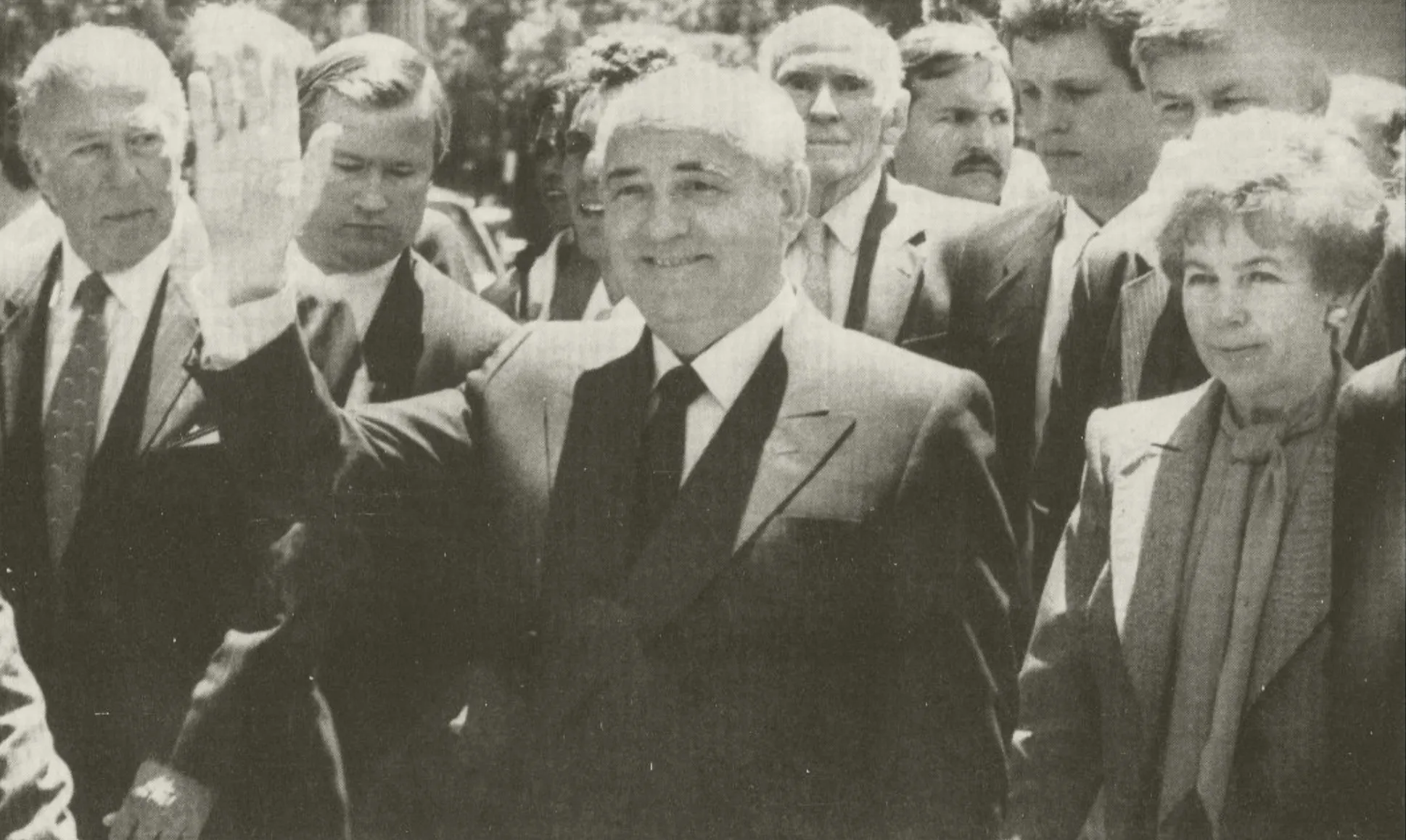Mikhail Gorbachev, who served as the Soviet Union’s final leader and is credited with transitioning the former country, and Eastern Europe, to post-communist governance, died Tuesday. Foreign policy leaders and Stanford affiliates praised his critical role in diffusing the Cold War and somberly observed his passing.
“I am saddened to hear of the passing of Mikhail Gorbachev,” wrote Hoover Institution Director and former Secretary of State Condoleezza Rice in a statement to The Daily. “He was a man who tried to deliver a better life for his people. His life was consequential because, without him and his courage, it would not have been possible to end the Cold War peacefully.”
Born in poverty, Gorbachev worked his way up the Soviet political ranks through the mid-20th century. Gorbachev joined the Communist Party’s Central Committee as its youngest member in 1971, and he ascended to the committee’s leadership ranks in 1980. The deaths of three party executives in under three years led Soviet leadership to elect a younger General Secretary, Gorbachev, a few years later.
“As Gorbachev’s presidency unfolded, it became clear that he was not going to be like the dour and geriatric Leonid Brezhnev, Yury Andropov and Konstantin Chernenko,” wrote Rose Gottemoeller, a Hoover Institution research fellow and former NATO Deputy Secretary General. “Only 54 when he took office, Gorbachev was easily the most dynamic figure seen in Moscow for nearly thirty years, with the confidence to speak openly on the public stage with foreign leaders such as Ronald Reagan and Margaret Thatcher.”
Though Gorbachev revered communist principles, he from the outset of his leadership sought to reform stagnant bureaucracy and allow intellectual and personal freedoms. Gorbachev also saw the defense budget, which was 25 percent of the Soviet Union’s GDP, as a major obstacle in his pursuit of an economy competitive with the U.S. He addressed this with a series of compromises and treaties with western countries.
Norman Naimark, a senior fellow at Freeman Spogli Institute for International Studies (FSI) and at the Hoover Institution, wrote that Gorbachev’s achievements were “considerable and improbable at the time” in a statement to the Daily. He wrote that Gorbachev’s arms control treaties built “a diplomacy of trust” and his government reforms greatly advanced living conditions.
“Gorbachev helped bring an end to the stultifying political structure of the Soviet Union that had held the peoples of that multinational country in bondage to a centralized and corrupt communist elite,” Naimark wrote.
Center on Democracy, Development and the Rule of Law Director and Hoover Institution Senior Fellow Kathryn Stoner labeled Gorbachev as “the greatest statesman of the 20th century” in a written statement to the Daily.
Stoner wrote that Gorbachev was “responsible for the end of the Cold War in many ways” and characterized the nuclear-weapon bans and arms reductions he signed with the U.S. as “foundational for the security of the planet.”
For Gottemoeller, “it really came home that Gorbachev was changing the USSR” during a 1989 visit with Mike Hurley, a friend in Moscow’s U.S. embassy. According to Gottemoeller, Hurley revealed he managed to get a piece on arms control authored by Max Kampelman, the lead nuclear negotiator for the U.S., published in the premier Soviet newspaper Izvestiya.
“Mike’s assignment during that stint in Moscow was to try to get a handle on whether ‘glasnost’’ — the opening of society — was real,” Gottemoeller wrote. “It was real.”
Stoner praised Gorbachev’s restraint of a military response to the fall of the Berlin Wall in the same year. One year later, the Soviet president brought his call for cooperation to the Stanford campus, speaking to a crowd of 1,700 about the importance of leadership and unity in the post-Cold War era. Gorbachev led by example — Naimark wrote that in the late 80’s and early 90’s, Gorbachev “freed Eastern Europe — the Poles, the Czechs, the East Germans, the Hungarians, and others — to develop politically as they wished.”
However, both Stoner and Naimark wrote that Gorbachev’s liberalization efforts were less successful in his own nation than in surrounding countries. Stoner said Gorbachev was a “tragic figure” whose “indecisive economic reforms” contributed to a “death spiral” for the Soviet Union.
Naimark wrote that Gorbachev faced a “dead end” from the “one-way street of an economically inefficient and politically tyrannical system,” and that though Gorbachev kept the peace, in the early 90’s “his countrymen rejected him as either too conservative or too radical.”
Gottemoeller wrote that her most striking memory of Gorbachev, who she met in the mid-2000’s at his birthday lunch, was his prediction that Soviet security forces such as the KGB grew more powerful and dangerous after the Soviet Union’s collapse.
“During the Soviet era, at least the Communist Party Central Committee kept them under control,” Gorbachev said, according to Gottemoeller. “Now, they have no one to answer to but themselves. They are more of a threat now.
According to Stoner, much of Gorbachev’s cultural liberalization of Russia has been undone by Vladimir Putin.
“Gorbachev’s Soviet Union was freer in 1990 than Russia is now in August 2022 sadly,” Stoner wrote. “I’m sure Gorbachev was disappointed when he died by what Russia has become under Putin today.”
